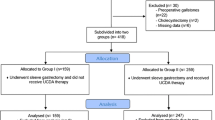Abstract
Liraglutide is a glucagon-like peptide-1 analog and recently started to be using as an incretin-based treatment for diabetes mellitus. Liraglutide causes some adverse affects including nausea, vomiting, acute nasopharyngitis and acute pancreatitis. However, development of liraglutide-dependent cholelithiasis has not been reported in the literature. A 75-year-old female patient had been diagnosed with type 2 diabetes mellitus for 10 years and she has been treated by liraglutide for 6 months. The patient was admitted to the emergency service due to sudden onset of abdominal pain. After laboratory and imaging studies, she was diagnosed with acute cholecystitis and cholelithiasis. And then patient’s oral intake was stopped, intravenous fluid and ceftriaxone 2 g/day were started. Furthermore, liraglutide treatment discontinued and ursodeoxycholic acid (UDCA) was started to treat cholelithiasis. During follow-up, abdominal pain completely relieved. Hepatobiliary ultrasonography in sixth month follow-up showed entirely regression of cholelithiasis. Any liraglutide-related cholelithiasis case has not been reported in the literature previously. Therefore, our case is the first case. Especially, elderly diabetic patients who are started to liraglutide treatment should be monitored closely for the formation of cholelithiasis. UDCA treatment would be an alternative prior to surgical treatment for liraglutide-related cholelithiasis.

Similar content being viewed by others
References
Peters KR (2013) Liraglutide for the treatment of type 2 diabetes: a clinical update. Am J Ther 20:178–188
Nauck M, Frid A, Hermansen K, Shah NS, Tankova T, Mitha IH, Zdravkovic M, Düring M, Matthews DR, LEAD-2 Study Group (2009) Efficacy and safety comparison of liraglutide, glimepiride, and placebo, all in combination with metformin, in type 2 diabetes: the LEAD (liraglutide effect and action in diabetes)-2 study. Diabetes Care 32:84–90
Peterson GE, Pollom RD (2010) Liraglutide in clinical practice: dosing, safety and efficacy. Int J Clin Pract Suppl 167:35–43
Knezevich E, Crnic T, Kershaw S, Drincic A (2012) Liraglutide-associated acute pancreatitis. Am J Health Syst Pharm 69:386–389
Kowdley KV (2000) Ursodeoxycholic acid therapy in hepatobiliary disease. Am J Med 108:481–486
Conflict of interest
The authors declare no conflict of interest relevant to this paper.
Informed consent
Informed consent was obtained from the patient included into the study.
Author information
Authors and Affiliations
Corresponding author
Rights and permissions
About this article
Cite this article
Korkmaz, H., Araz, M., Alkan, S. et al. Liraglutide-related cholelithiasis. Aging Clin Exp Res 27, 751–753 (2015). https://doi.org/10.1007/s40520-015-0335-2
Received:
Accepted:
Published:
Issue Date:
DOI: https://doi.org/10.1007/s40520-015-0335-2




